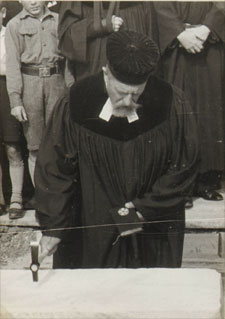Friedrich Seggel: Against the November Pogrom
Friedrich Seggel (1877–1965) was one of the few Bavarian pastors, who publicly condemned the crimes of the November Pogrom of November 9-10, 1938 in a sermon. In 1920, Seggel had become the pastor in Mistelgau where he soon earned a reputation as a political preacher (Marlen Rabl, Seggel, 55).
He described himself as strictly German National, judged elements of Nazi ideology positively and was a member of the NSDAP. His relationship with National Socialism remained ambivalent, though, and turned into partial opposition during the Nazi regime. His Christian beliefs and his often earthy, authoritarian and self-confident manner had landed Seggel in conflicts with the Nazi authorities time and again since 1933.
The local group leader reported Seggel to authorities in March of 1934 because he had criticized the attempts to coordinate the church, the persecution of pastors and Nazi racial ideology in his sermons. The charges were dropped, however, as were two other reports on account of critical remarks and views hostile to the state, which were filed in 1935 and 1936.
Repeated reports to authorities, surveillance and demands for his dismissal did not stop Seggel from publicly denouncing the violence of the November Pogrom in his Day of Repentance sermon on November 16, 1938. Although his sermon on the Kristallnacht, which he delivered several times, contained anti-Semitic statements, Seggel clearly condemned the atrocities at holy places and professed, as a German I do not want to raise my hand in violence against a Jew. The perpetrators had been brutes; a Christian just does not do that (Marlen Rabl, Seggel, 63f.).
This sermon led to another report to the authorities. Since his parishioners would not make any clear statements, these charges were also dropped. In the following years, charges were brought three more times for criticizing a Hitler Youth leader, publicly announcing membership withdrawals and violating building codes.
Although he suffered a multitude of reprisals, Seggel ultimately escaped serious consequences thanks not only to his skilled wording during interrogations but also to the support from his parish and ecclesiastical superiors.
Source / title
- © Private collection of Theodor Glaser, Munich

